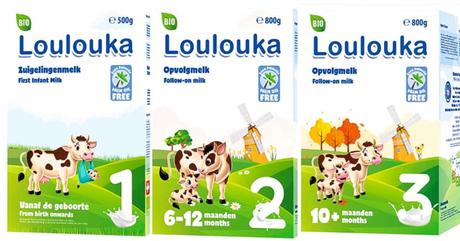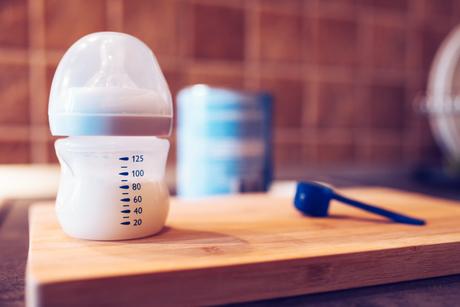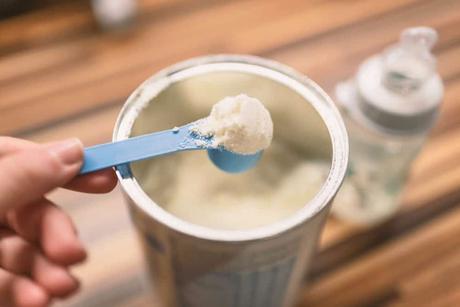This post may contain affiliate links. Please read my disclosure.
This in-depth guide will help you learn everything you need to know about one of the newest organic formulas on the market: Loulouka formula. You'll learn more about what Loulouka is, what the benefits are, how it compares to other organic baby formulas, and where you can find & buy it!
With so many baby formula brands competing to create organic baby formulas-it can be hard to choose the right one for your baby. Recently, a new brand has been receiving great reviews from parents around the globe. For parents wondering if Loulouka is worth the hype, and if it meets the criteria for a healthy baby formula, this post is for you!
What Is Loulouka formula?
Loulouka was founded in 2012 by Michael, Peter, and Christiaan - all of whom are parents, and who have over 10 years of experience in the formula industry (you can read more about the founders here). Their goal was to find a producer that could create an organic baby formula without palm oil, without soy oil, and with a whole milk base. After a ton of research and years of development, Loulouka hit the market in 2019.
Is Loulouka a safe and healthy baby formula?
From my research, Loulouka seems like a legitimate, safe, and very healthy option for your little one. Loulouka is formulated in Switzerland due to its strict regulations and high standards for treatment of cows, organic food and baby formula production. For example, on organic Swiss farms there are only 23 cows (max) allowed per farm - the lowest in the world! Additionally, Michael, Peter, and Christiaan believe in treating animals with compassion and being environmentally friendly through their practices. Loulouka's signature protocol requires 50 specialized quality checks to ensure each formula is safe. It is certified organic by the EU, which has much higher organic standards than the US.

What are the Benefits of Loulouka?
#1 | EU Certified Organic, Humane treatment of cows
European formulas are popular for a reason - European organic standards and farming regulations are much higher/stricter than US organic standards. You can read more about the standards for European formulas here, and the benefits of organic formula here. In addition, Swiss cows are treated much more humanely than American cows. Rather than being crammed into a factory (like American cows), Swiss cows graze all day on natural grass and hay - improving the overall quality of the milk. No steroids, hormones, preservatives, pesticides or chemicals are used in the production of Swiss milk (which is what Loulouka uses).
#2 | No Soy
Loulouka uses whole cow's milk to provide naturally occurring proteins, and on top of that, uses no soy ingredients (no soy oil, soy lecithin, soy protein). Why does this matter? Research has shown that too much soy in infancy can have negative effects later in life. Here is an in-depth explanation on soy during infancy.
#3 | Healthy Fats, No Palm Oil
Most organic regulated formula's fat source originates from vegetable oils, including palm oil. Baby formula producers use palm oils because it is similar to palmitic acid, to mimic a nutrient found in breastmilk. Palm oil also contains vitamin E and beta-carotene. While these oils are safe and are essential for growth, palm oil has negative environmental implications and may cause digestive issues (for babies that are sensitive to palm oil). Loulouka uses coconut oil as the primary fat source, which also helps in making it very close to breastmilk in composition (with 15.8% palmitic acid). Coconut oil also has a high concentration of medium chain triglycerides, which helps with absorption, and the composition of saturated fatty acids in coconut oil is similar to breastmilk (43% vs. 38% in breastmilk).
#4 | Lactose as the Carbohydrate
Unless your baby has lactose intolerance, lactose is the best primary carbohydrate that a baby formula can include. Cheaper, processed substitutes for lactose include: maltodextrin, corn syrup, glucose syrup solids, sugar, brown rice syrup, sucrose, etc. In formulas that are hypoallergenic, some of these ingredients may be unavoidable. But for regular, organic baby formula, these ingredients should not be included as a source of carbs. Loulouka Stage 1 uses 100% lactose for their carbohydrate, meaning parents are getting the best carbohydrate for their babies without the non-lactose sugars.
#5 | Whole Milk
Whole milk contains naturally occurring vitamins and minerals that babies need for growth and development. Skim milk has less calcium, vitamin D and iron than whole milk. While skimmed milk is perfectly safe and fine to use in baby formula, producers may have to add additional vitamins back into the formula that are lacking in skim milk.
In addition to these benefits, Loulouka doesn't contain any of the ingredients I recommend avoiding (that other baby formulas do contain). Those include: GMOs, soy products, added sugars, and synthetic ingredients. You can see more details on which ingredients to avoid in baby formula here.
Where Can You Find and Buy This Formula?
The great thing about Loulouka is that it's very easy to get in the US from one of my favorite distributors: My Organic Company.
My Organic Company was founded in 2017 by two parents: Cecelia and Kevin who are dedicated to ensuring that organic European formulas are available to any parents who want them in the US! They have three different warehouses across the US to ensure safe, fast and reliable shipping. And their supply chain is so robust they virtually guarantee that they will be in stock of all formulas at all times!
In addition to Loulouka, they have all the standard European formulas like HiPP Dutch, HiPP UK, HiPP Germany, Holle, Lebenswert, Goat Milk formula, and the sensitive formulas ( HiPP HA, HiPP Comfort, Anti-Reflux). They offer the largest most expansive set of European formulas available today.
My Organic Formula ships free on orders over $50, and you can receive an additional 10% off by using the code "THEPICKYEATER" at checkout.
Other things that make them great: they have a comprehensive mixing guide for every formula that's easily accessible here, they have a subscribe and save option (save an additional 7%), and amazing customer service!

What are the Differences Between Stage 1, 2, and 3 of Loulouka?
There are slight differences between the 3 Stages of Loulouka - so to help you figure out which one is best for your baby, I've outlined the differences between Stages 1, 2, and 3 below.
Stage 1
Loulouka Stage 1 is for birth and onward. You can use this formula to replace breastmilk or use alongside it as a supplement. The great thing about this formula is that you can use it right after birth and throughout the first year! This is rare in baby formulas, as most formulas require a transition in stages. Due to Loulouka's consistency, it allows the baby to continue without the switch. This formula is easy on digestion and contains all essential vitamins, including Vitamins A, C, & D and Iron. Lactose is the only/primary carbohydrate used (Stage 1 is 100% lactose), and coconut oil is the primary fat.
Each box comes with 500g of formula powder and instructions, and you'll get approximately 44 bottles per 500-gram box.
Stage 2
Loulouka Stage 2 is perfect for babies aged 6-12 months. While it's not necessary to switch from Stage 1 to Stage 2, some parents may want to switch due to the higher iron content and the added DHA/ARA in this Stage 2 formula. Stage 2 has 1mg iron per serving compared to 0.8mg iron per serving of Stage 1. The other main difference between Stage 2 and Stage 1 is that Stage 2 has 70% lactose, and 30% maltodextrin - which is added to make the formula thicker in consistency than Stage 1.
Each box comes with 800g of formula powder and instructions, and you'll get approximately 35 bottles per 800-gram box.
Stage 3
Loulouka Stage 3 is for babies 10 months and onward. This "follow-on milk" is perfect for parents who want to use formula into toddlerhood. It has more iron than Stage 1 (1mg vs 0.8mg iron in Stage 1), and has added DHA/ARA just like Stage 2. Stage 3 also has added maltodextrin, similar to Stage 2, and has slightly more calories per serving than Stage 2 or Stage 1. Note: this formula is not to be used as a breastmilk supplement during the first 6 months of age.
Each box comes with 800g of formula powder and instructions, and you'll get approximately 35 bottles per 800-gram box.

How Much Formula Should My Baby Drink Each Day?
If you've decided to formula feed, you might be wondering exactly how much your baby should be drinking. Here are some general guidelines when it comes to formula feeding based on your baby's age - but you should always consult with your pediatrician if you have any feeding related questions or concerns.
Final Thoughts
For parents who value nutrition, wholesome ingredients, and EU organic certification-Loulouka could be the perfect formula for you and your baby! Created by professionals in baby nutrition, this formula combines all the things parents want with a taste babies' love. Loulouka is made with sustainable, organic Swiss milk and has no synthetic ingredients, no palm oil, and no soy products - which means you can be confident your baby is getting a healthy, safe, and nutritious formula to promote growth and development. Loulouka is one of my top ranked organic baby formulas among all of the options out there! If my kids were still in the 0-12 months range, I would feel confident purchasing Loulouka to give to them.

